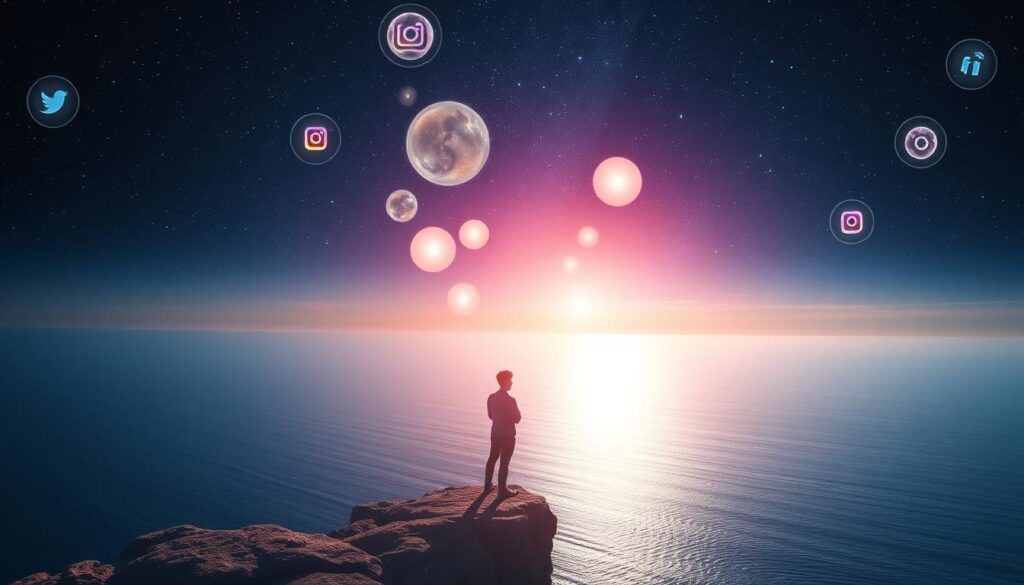The Filtered Life: The Pressure to be Perfect on Social Media

“Facetuned faces, perfectly posed bodies, and envy-inducing vacations… Scrolling through social media can feel like stepping into a parallel universe where everyone’s life is flawlessly filtered and #blessed.”
But behind the curated feeds and picture-perfect posts lies a darker reality: the relentless pressure to be perfect. It’s a pressure that seeps into our minds, warping our self-perception and leaving us feeling inadequate in a world of carefully constructed highlight reels.

Did you know that 60% of teens report feeling worse about their own appearance after spending time on social media? Or that studies have linked social media use to increased rates of anxiety, depression, and body image issues?
The filtered life is a mirage, a carefully crafted illusion that masks the messy, beautiful reality of human existence. It’s time to break free from the comparison trap, challenge unrealistic beauty standards, and embrace our authentic selves, imperfections and all.
In this blog post, we’ll explore the sneaky ways social media fuels the pressure to be perfect, its impact on our mental health and self-esteem, and practical strategies for cultivating self-acceptance and building a healthier relationship with the digital world.
The Dangers of Comparing Yourself to Others on Social Media
In today’s world, social media affects how we see ourselves. We see perfect lives on our screens and feel like we’re not good enough. This makes us want to be perfect online, hurting our self-esteem.
The Negative Impact on Self-Esteem
Looking at others’ perfect lives makes us feel bad about ourselves. We start to judge our looks, achievements, and life compared to theirs. This makes us feel insecure and less worthy, harming our happiness.
The Illusion of Perfection
Social media shows us perfect lives, but they’re not real. People pick and edit their posts to look flawless. This makes us think everyone else is perfect, without flaws or problems.
It’s important to remember that online lives are not real. They hide the messy parts of life. By understanding this, we can protect our self-image and have a better relationship with social media.
“The only person you should try to be better than is the person you were yesterday.”
Overcoming the Need for Social Validation
In today’s world, we often chase perfection on social media. But, we must remember that true validation comes from within. Feeling the need to be perfect online can make us feel bad about ourselves.
It’s important to accept our flaws and be true to ourselves. By doing so, we can stop looking for approval from others. This way, we find the strength to love ourselves truly.
Redefining Success on Social Media
We shouldn’t judge our worth by likes or followers. Let’s celebrate our unique qualities and share them proudly. This change helps us and others feel more real and connected online.
Embracing the Imperfect Journey
Changing how we see ourselves is a journey. It’s about finding happiness in our imperfect moments. By sharing all parts of our lives, we learn to accept ourselves fully.

Perfection is just an illusion. By letting go of the need for validation and embracing our flaws, we find true freedom. We learn to love ourselves from the inside out.
Embracing Imperfections in a Filtered World
Social media shows us perfect lives all the time. It’s easy to want to be perfect too. But, it’s important to accept our flaws and be real.
The Power of Authenticity
Being real means showing our true selves, with all our flaws. When we share our real feelings and struggles, we inspire others. This helps us make deeper connections.
Cultivating Self-Acceptance
Accepting ourselves is a journey. It’s about loving ourselves, even with our flaws. By focusing on our strengths and growth, we gain confidence.
Being real online helps us accept ourselves more. Share your story and inspire others to do the same.

“Authenticity is the daily practice of letting go of who we think we’re supposed to be and embracing who we are.”
– Brené Brown
Building Self-Esteem in the Age of Social Media
In today’s world, it’s key to have a good relationship with social media. We should be careful about what we see online. Also, we should not spend too much time looking at screens.
It’s important to be real and open online. This helps us feel better about ourselves. Setting limits on our digital use can also help us avoid feeling bad when we see others’ perfect lives.
To feel good about ourselves in the digital age, we need to do many things. We should learn to accept ourselves, stay present, and use social media wisely. This way, we can feel strong and help others feel the same.



